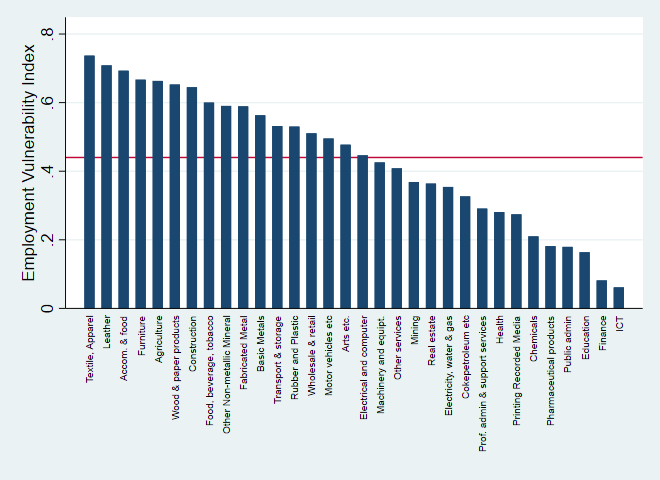Photo: Simone D. McCourtie / World Bank
Authors: Sırma Demir Şeker, Efşan Nas Özen, and Ayşenur Acar Erdoğan
COVID-19 has brought existing economic vulnerabilities into view globally. Turkey is no exception as the Turkish labor market already has significant challenges: exchange rate depreciation and inflation, low female labor force participation, high youth unemployment, and the Syrian refugee influx starting from 2011. All that is bound to exacerbate the employment effects of the pandemic.
In our new paper, “Jobs at risk in Turkey: Identifying the impact of COVID-19”, we analyze how and to what extent various labor sectors are vulnerable to the COVID-19 crisis. We consider both effects specific to COVID-19, and the type of economic risks workers face due to sector- and employment-specific vulnerabilities.
What factors could cause job loss?
Two major effects led to job loss in Turkey during COVID-19: 1) sector closures and lockdowns, and 2) infeasibility to complete work-related tasks from home. Share on X Depending on the intensity of face-to-face interaction required in performing jobs, some sectors were instructed to close temporarily in Turkey as a health and public safety precaution. Essential sectors — health and agriculture — continued operation, and operations continued to the extent possible in some manufacturing sectors such as food production and petroleum production.
Meanwhile, continuation of operations in the remaining sectors depended on whether the tasks required by those sectors could be adjusted to remote work conditions. For instance, non-essential sectors that require high face-to-face interaction such as construction and service sectors were more likely to see a significant decrease in their operations.
Working from home is feasible for around 10 percent of workers
To identify amenability to working from home, we used a methodology in our study that considers physical intensity, face-to-face-interaction, computer usage, and internet and communication technology (ICT) access at home. We found that finance and ICT have the highest amenability to working from home, while workers in agriculture, textile, apparel, leather, and construction are least likely to continue their work-related tasks from home. Overall, working from home is feasible for a small group of people, as little as around 10 percent of workers in Turkey. Share on X
Sectors with high employment vulnerability have the lion’s share of employment
Using amenability to working from home, we developed an employment vulnerability index for Turkey. The index considers education and skills levels, several aspects of employment vulnerability, higher economic vulnerability in the sector as identified in the Turkey Economic Monitor, and vulnerabilities due to deficiencies in worker protection and income generation capability of workers.
The study shows that manufacture of textile and apparel, manufacture of leather, accommodation and food, and agriculture are the sectors with highest employment vulnerability Share on X, whereas ICT and finance sectors, with high-skilled workers, non-routine jobs, and high protection and earnings, have low employment vulnerability.
Employment Vulnerability Index for Turkey
 Source: Authors’ calculations
Source: Authors’ calculations
It’s worrisome that around 66 percent of employment in Turkey is in sectors with higher than average employment vulnerability. Share on XTextile and apparel, accommodation and food, leather, construction, transport and storage, and motor vehicles and transport vehicles are sectors that show both high sector vulnerability as well as employment vulnerability. The study reveals the concerning fact that around 7 million workers in Turkey are at risk of losing their jobs due to the crisis of COVID-19. Share on X
Turkey’s response: What’s next?
Turkey’s response to COVID-19 was swift, with several measures including one-off cash transfers to over 5 million households, and labor market regulations to limit layoffs and provide short-term wage allowance, all to prevent income losses for Turkish households. Turkey was prepared to respond to the shock since Turkey has experienced several in the past, such as economic crises and the Syrian refugee influx. Therefore, the poverty rate is expected to increase only around 1 percentage point due to the COVID-19 pandemic, largely thanks to the existing social assistance system.
Nevertheless, as the stifling conditions created by the pandemic still pose a considerable challenge for the labor market. The burden on social assistance will need to be relieved, and improving the employability of the poor and vulnerable — old and new — will be important. Going forward, policies should prioritize creating targeted interventions not only in social assistance, but also in improving employability — particularly for vulnerable groups. Emphasis should be on adapting active labor market programs and information systems to emerging jobs and work modalities, and linking social assistance and employment through systematic screening, registration, and monitoring.




